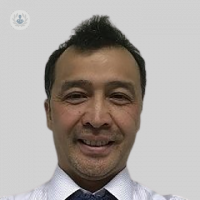Fetal development
Professor Mina Savvidou - Obstetrics & gynaecology
Created on: 05-01-2016
Updated on: 10-16-2023
Edited by: Conor Dunworth
Three weeks after the first day of your last period, your fertilised egg (ovum) moves slowly towards the uterus. From that moment on and for the following 35 weeks, the embryo develops and becomes a foetus. The baby will continue to grow inside the uterine cavity up until the delivery date. You’ll probably start to feel your baby moving about from weeks 15 to 22.

Month 1
By week 4 the baby is about 2-5 millimetres long and going through the organogenesis phase - the formation of organs and of the nervous system. The baby already has a heart and stomach, but no mouth nor eyes; nor is it yet possible to distinguish any limbs. The embryo, attached to the placenta by the umbilical cord, floats in the amniotic cavity.
Month 2
During this phase of the pregnancy the organs continue to develop. The baby, weighing about three grams and three centimetres long cannot see or hear well yet.
The baby’s brain, liver, stomach and pancreas are fully formed. The limbs keep on stretching and growing, the spinal column and the first muscles are developing, and the heart starts to grow. The nose and ears are now more obvious, and the tongue and optic nerve develop more and more.
Month 3
During the third month, the foetus grows three times in size. The nerve cells start growing and the baby’s skeleton becomes clearer as well. The fingers start move and the baby may close them in a fist, although no movement is controlled by the brain yet. The eyes are now fully formed, the mouth can open and close, the lips become more distinct and the nostrils slowly begin to open up.
The baby starts making sucking motions with the mouth. By the end of the third month (week 13) the foetus will weigh about 65 grams and will be about 12 centimetres long.
Month 4
During the fourth month the baby’s body will be covered in lanugo, a very fine, soft hair.
The appendix starts to grow The amniotic fluid flows in and out of the baby’s lungs, even though the lungs haven’t developed their final respiratory function yet.
The hearing system is now complete; the foetus can’t see yet, but the retinas are already light-sensitive.
Month 5
During the fifth month, the baby’s muscles grow stronger, a thin, soft hair starts growing on the head and the baby now has his or her own fingerprints. It is now time for second ultrasound, the mid-pregnancy anomaly scan, which often allows to discover the sex of the baby.
Around week 21 the baby weighs about 300 grams and is roughly 24 centimetres long.
Month 6
During this month the baby’s sexual organs start developing. Tooth buds and fingernails start to form. This is the beginning of one of the most exciting phases for parents – the baby starts hearing and will react to touch and sound.
Month 7
This is the stage when the brain and the nervous system grow mature. The baby can open his or her eyes and respond to light. The baby weighs around 1.5 kilograms and is about 37 centimetres long.
Month 8
During the eighth month the baby’s hearing system improves. The baby is feeding on amniotic fluid and the taste buds, digestive tract, kidneys and fingernails continue to develop. The baby is now able to feel pain.
Month 9
During the last month of your pregnancy the baby grows plumper due to subcutaneous fat accumulation. The baby’s head should move down to your pelvis, getting ready for birth - this happens in 95% of the cases. However, the brain is not fully developed yet, even though it keeps growing rapidly.

